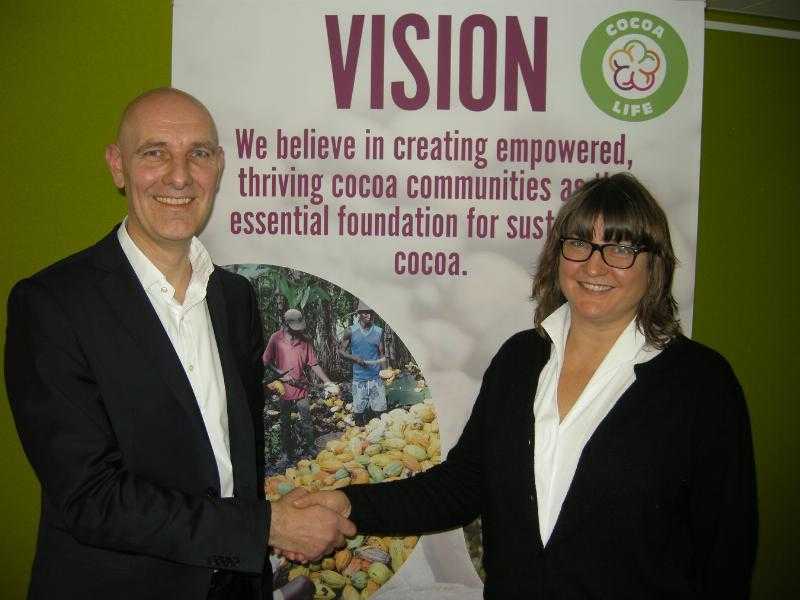DEERFIELD, Ill., USA – Mondelez International, the world’s largest chocolate company, and FLOCERT, a socially focused global certification body, today unveiled a new partnership to verify cocoa volumes and commercial transactions for the company’s $400 million Cocoa Life program.
Cocoa Life will work with FLOCERT to employ a tailor-made version of its FLOTIS reporting system to verify the quantity of sustainably grown and traded cocoa and to provide verification of Cocoa Life premium payments made to farmer organizations.
“Cadbury Dairy Milk was the first mainstream chocolate bar to carry the FAIRTRADE Mark,” said Cathy Pieters, Cocoa Life Program Director.
“Now we are delighted to bring a new dimension to our relationship with the Fairtrade family through this partnership between Cocoa Life and FLOCERT. Our aim is to know farmers are benefiting from a healthy supply chain with clear terms of trade, better access to markets, and new ways for their voices to be heard.”
Originally developed to monitor Fairtrade certification, FLOTIS enables FLOCERT to support verification programs like Cocoa Life.
FLOTIS is a comprehensive monitoring tool that enables transparent transactions reporting and supplies statistical data for its evaluation, thus assuring and facilitating fair trading processes.
The contract will run for three years, with an option to extend until 2022.
“Mondelez International is a long standing strategic partner of Fairtrade,” said Rudiger Meyer, CEO of FLOCERT. “We are pleased at the opportunity to further support this cooperation by supplying them with our verification services to help the Cocoa Life program measure progress towards achieving its goals.”
Cocoa Life is impact-focused and independently verified. The partnership with FLOCERT will provide a system to verify the Cocoa Life supply chain, completing the Cocoa Life verification framework alongside the Harvard University research team evaluating the program impact on the ground, announced in June 2014.
Integrating with Mondelez International’s supply chain is key to Cocoa Life. The company’s cocoa suppliers help implement Cocoa Life by training farmers to improve productivity and income, and by buying their cocoa. Cocoa farmers will have more confidence as purchase volumes will be agreed upfront each harvest season.
Major cocoa processors such as Barry Callebaut and Cargill agree on the importance of Cocoa Life’s verification framework.
“As a cocoa and industrial chocolate supplier to Mondelez International, we have a key role implementing Cocoa Life, alongside non-profit and other partners,” said Nicko Debenham, VP Global Cocoa Sustainability, Barry Callebaut. “Verifying Cocoa Life’s terms of trade will build farmers’ confidence in the program and encourage them to participate.”
“Mondelez International is seeking to build closer relationships with cocoa communities by linking cocoa supply with its investment in Cocoa Life,” said Taco Terheijden, Manager Sustainable Cocoa, Cargill Cocoa & Chocolate.
“As defined in the Cargill approach we rate partnerships and transparency as critical components for a sustainable supply chain. This verification will strengthen our relationship by ensuring benefits flow to farmers.”
About Cocoa Life
Cocoa Life aims to reach more than 200,000 farmers across six countries, benefitting more than a million people. Mondelez International’s ultimate goal is to sustainably source all the company’s cocoa supply, mainly via Cocoa Life.
By working in partnership with farmers, NGOs, suppliers and government institutions, Cocoa Life answers Mondelez International’s Call For Well-being, which urges employees, suppliers and community partners to join together to develop new approaches that can have a positive impact on the planet and its people.
The Call For Well-being focuses on four key areas where the company can make the greatest impact: mindful snacking, sustainability, community and safety.
Mondelez International is the world’s largest purchaser of Fairtrade certified cocoa. Certified products under its Cadbury Dairy Milk brand are available in key markets including the United Kingdom, Ireland, Australia, New Zealand, South Africa and Canada.


















